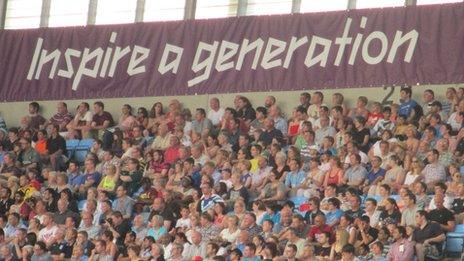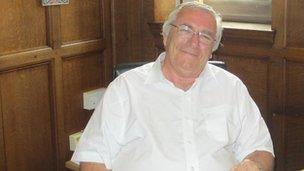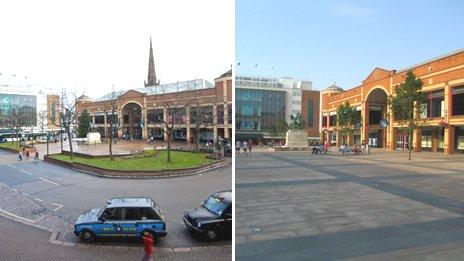2012 Olympics: What will Coventry's legacy be?
- Published

Fans took part in Mexican waves around the stadium in Coventry, but will the city remain inspired at the Olympics?
People chat in the sun in Coventry's new pedestrian square while others watch acrobats rehearse for a Cultural Olympiad event. The city, which is hosting Olympic football, has a twinkle in its eye.
But will there be an Olympic legacy for Coventry after the buzz has gone?
John Mutton, Coventry City Council Leader, likes to sit in Broadgate, the central square pedestrianised as about £8m of work was carried out ahead of the Olympics.
"I just sit on a bench sometimes reading a newspaper, trying to be hidden away and I love hearing what people say," he said.

John Mutton hopes the city's turn on the worldwide stage will have lasting benefits
The Olympics were the "hook" that attracted £3.5m of European funding to the council's spending and speeded projects up.
"We used the Olympics as a council as a reason why we needed to improve the look of the city and particularly the city centre and it's not just for visitors because that's part of the legacy for Coventry people," he said.
Simon Chadwick, professor of Sports Business Strategy and Marketing at Coventry University, said some city schemes did not result from the Olympics, but their value was as "enabler and facilitator" bringing projects forward.
The city's revamp has also included bringing into better use medieval properties, removing "grotty subways" and providing more green spaces.
Labour leader Mr Mutton said two or three international companies were showing interest in rebuilding the city centre, which would be a "major boost" for the economy.
"They have seen that we are a city that is not prepared to use the recession as an excuse to sit back and do nothing and we want to drive this city forward," he said.

Broadgate's square will host events and attract visitors, the council says
Mr Mutton said although it was "hard to quantify" the economic benefits of the Olympics, they had had a significant impact on creating and safeguarding jobs.
Firms in the city and Warwickshire won contracts exceeding £80m, including a factory which made the Olympic relay torches.
And he had heard predictions that £50m would be spent in Coventry by visiting football fans.
'Legacy of pride'
However, Prof Chadwick said many visitors were bypassing the city and going straight to the Ricoh Arena - renamed the City of Coventry Stadium for the Olympics.
He anticipated their spend would therefore be "in the hundreds of thousands" rather than millions.
"I'm not sure the economic impact will be significant," he said.
Meanwhile, Mr Mutton said although legacies were very difficult to predict, he hoped the city's appearance on the world stage would have a profound impact.
There has been more than 50,000 downloads of the city's Olympic app around the world which he said had prompted much interest in Coventry, including from tour operators.
Mr Mutton said he wanted tourists to stay in the city for several days instead of the traditional hour at the cathedral before going "off to Stratford or the Cotswolds".
He also hopes the city's Games involvement will install pride.
"That's what I want, because I believe if that happens, a lot of the other problems that exist in the city will be overcome as well," he said.
This is a view shared by Tom Clift, who has been finding ways of bringing regional benefits from the Olympics, both as manager of a group combining voluntary, private and public bodies, and now for the council.
He highlighted how up to 8,000 pupils had tried activities as part of the Festival of Sport programme, while about 1,000 residents were involved in Godiva Awakes - the city's Cultural Olympiad festival.
More than 300 people had also volunteered to welcome visitors as "Coventry ambassadors".
"I think the legacy will be pride from local people, the building work achieved and the local economic impact," Mr Clift said.
'Jury out'
He added the Africa Inspires project, which twinned five Coventry and Ugandan schools and forged links between rotary clubs, helped provide access to clean water in Kampala and created sports opportunities.
As it was a pilot project, Mr Clift said funding partners would decide if it would continue.
Prof Chadwick said this was key as Olympic legacies "came from people" and were determined by having the "advocates" and finances to continue projects.
"It feels good being here at the moment, but the question is how much of all this can be sustained once the Games is over?" he asked.
"In all discussions about legacy, subtle political rhetoric is at play and some claims can be disingenuous."
He said there was compelling evidence that, for Barcelona, hosting the 1992 Olympics "changed the city", but Coventry dose not have the infrastructure projects in place for such a change.
And he added that the "jury was still out" on whether hosting the Games had resulted in sustained economic activity in Athens, Montreal and Los Angeles.
- Published25 July 2012
- Published23 April 2012
- Published23 July 2012
- Published20 March 2012
- Published7 March 2012